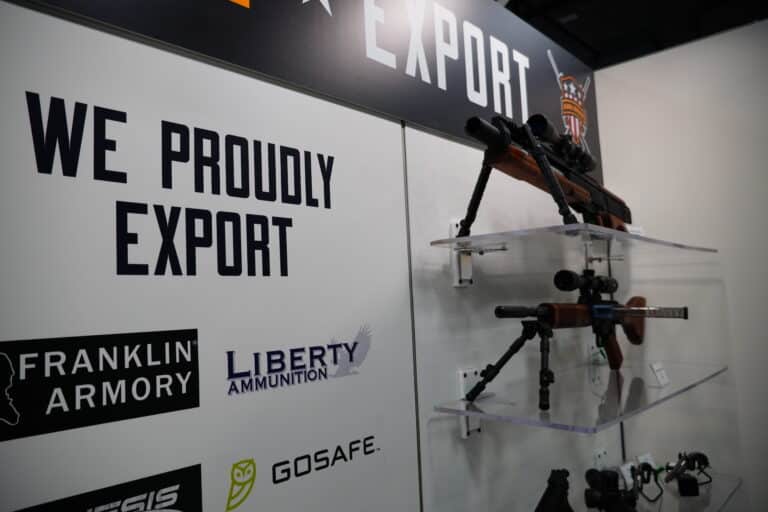The Commerce Department is cracking down on civilian firearms exports, including to American allies like Israel and Ukraine.
The Biden Administration published the final version of its new gun export rule on Tuesday. The changes in the final proposal mirror many of those in a leaked draft published exclusively by The Reload in December 2023. One of the included restrictions is a requirement that American exporters collect passports or national IDs from any individual buyer they ship certain semi-automatic guns to in most countries, including Israel and Ukraine.
“This IFR amends the EAR to require that a passport or national identity card be submitted for exports and reexports of firearms and related items to natural persons in non-A:1 countries,” the rule reads. “Previously, passports or other national identity cards were not required with submission of applications for export to individuals unless requested by BIS for a specific license application.”
The rule is one of a half dozen attempts by President Joe Biden to tighten American gun laws without action from Congress. It comes after the Commerce Department partially shut down new firearms export licensing in October 2023. It proposes several significant changes to how permits are issued and adds new restrictions on friendly nations, which could harm the firearms industry and relations with the affected countries.
The rule tightens restrictions on licenses for exports to individuals in any nation that isn’t in the Wassenaar Arrangement, like Israel. But the rule also applies to some countries in the agreement, such as Ukraine. Anyone personally importing a gun in a country that isn’t listed as part of “Group A:1” under the Bureau of Industry and Security’s classifications falls under the new requirements. While that’s a new requirement, it is less severe than what was found in the draft rule because that would have extended to all civilian exports into those countries–including those sent to distributors or retailers.
In addition to forcing exporters to collect passports from certain foreign gun buyers, the rule imposes several other reforms. It would decrease the length of export licenses from four to one year and sunset current licenses early. The rule also creates a new list of 36 “high-risk” countries, from the Bahamas to Jamaica to Pakistan, where export licenses would be denied by default–even to distributors or dealers.
The Department of Commerce did not respond to a comment request. However, the rule justifies many of the changes as necessary to crack down on potential trafficking in American-made guns by bad actors overseas. It said Commerce had identified incidents where American guns had ended up being used in crimes abroad.
“In one case, a firearm that was licensed for export to one country was subsequently diverted to a bordering country and used in a political assassination,” the rule said. “In another, a license exception was used to export parts for the unlawful assembly of firearms in Taiwan. BIS also identified instances of firearms and ammunition exports being diverted to Russia via commercial resellers in third countries; such firearms and ammunition may be used to support Russia’s further invasion of Ukraine.”
The rule claimed the new restrictions aimed to stop those sorts of incidents.
“Commerce determined that the existing licensing procedures and requirements did not provide it with sufficient documentation and data to evaluate national security and foreign policy risks effectively,” it said. “In particular, limited documentation requirements made it challenging to validate that firearms and related items are exported only to trustworthy foreign partners. Existing data collection practices also limited visibility of agencies that participate in the license review process into trade flows for different types of firearms under its jurisdiction, rendering it difficult to assess whether lawful exports might be at a particularly acute risk of diversion.”
The firearms industry disagreed with that assessment. The National Shooting Sports Foundation, an industry trade group, warned the rules would harm gun businesses. It argued that was the Administration’s real goal.
“President Joe Biden’s hostility against Second Amendment rights and our industry clearly shows no bounds and he’s used every governmental lever to crank up punishing restrictions that will have no bearing on improving national security or crime reduction,” Larry Keane, the group’s general counsel, said in a statement. “This administration is interested in one thing only – decimating the industry that provides the means for law-abiding citizens to exercise their Second Amendment rights.”
Jordan Young runs one of the businesses likely to be affected by the rule. In January, he told The Reload he worried his export company, Global Defense, would fail under the proposed changes. He said he hasn’t been able to obtain new export licenses since before the shut down began, and Commerce is unlikely to begin issuing new licenses for several more months.
“You don’t have a sale without a license,” Young said. “You can have the money, you can have the guns, you can have everything in place. But, if you don’t have a license, you don’t have a sale.”
He emphasized that his company only does business with reputable importers and always follows the laws of every country involved. He said he didn’t believe the incidents Commerce pointed to as a catalyst for the new restrictions justified them.
“Violence will happen, no matter where you are, no matter what you’ve got. They’ll use a rock, they’ll use a knife, they’ll use a car,” he said. “I mean, they’ll use anything. The bad people are still bad people.”
Young said large exporters will probably be able to weather whatever new restrictions the Biden Administration imposes, but he worries his company may not.
“I’m doing what I love,” he said. “I finally became my own boss, an entrepreneur, doing everything that I wanted to do, and it could all be done tomorrow.”
The rule now faces a two-month comment period where the public can recommend changes. Unless the agency withdraws the rule, it will go into effect on May 31st.
UPDATE 5-3-2024 7:50 PM EASTERN: This piece has been corrected to show some export licenses were processed during the pause and the effective date of the new rule.







One Response
The gun dealer probably could get a waiver if he donated to The Big Guy. See Obama and Gibson Guitars.